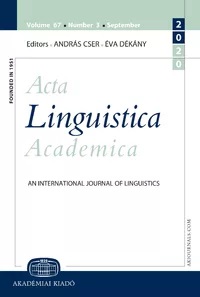Exploring (non-)ritual patterns of phatic interaction (small talks) at different phases of social encounters in Persian linguaculture
Exploring (non-)ritual patterns of phatic interaction (small talks) at different phases of social encounters in Persian linguaculture
Author(s): Zohreh R. Eslami, Azizullah Mirzaei, Maryam FarniaSubject(s): Pragmatics
Published by: Akadémiai Kiadó
Keywords: phatic interaction; Persian; small talk; pragmalinguistics; speech act model
Summary/Abstract: The current interpretive study aimed to characterize the (non-)ritual, phatic clusters of speech acts that conventionally recur around the opening/closing phases of Persian speaking students' social encounters or occur during the core (or ‘business’) phase of natural interactions as small talk in Persian. The study was conducted in Iran's Persian linguaculture where considerable social-cultural-economic changes have taken place over the last decade or so impacting the form and content of phatic interaction in all sectors of the society. The participants of the study were 97 Persian-speaking university students attending a state-run university located in the southwest of Iran. The students were asked to audio-record their natural interactions in four different social encounters varied based on the standard sociolinguistic parameters of Social Distance and Power (+/−SD, +/−P). We adopted House & Kádár's (2022) pragmalinguistic and speech act-anchored model of phatic interaction to code the (non-)ritual realization patterns of small talks around the opening, closing, and core phases of interaction. The results indicate that small talks which are co-constructed by the Persian interactants at the opening and closing phases of their social encounters are highly ritualized in terms of the speech act types and pragmalinguistic structures employed. Further, interpersonal interchanges which involve differential sociolinguistic P and SD values require more tactfulness and care in adhering to the greeting and parting conventions as more face-threat is potentially implicated. In terms of the medial phase, except for a small number of ostensible realizations of different speech acts such as invites, offers, and apologies, core off-topic phaticity was perceived to be non-ritual and discursive in Persian the interpretation of which heavily relies upon shared sociopragmatic knowledge of the linguaculture.
- Issue Year: 70/2023
- Issue No: 4
- Page Range: 419-444
- Page Count: 26
- Language: English
- Content File-PDF

